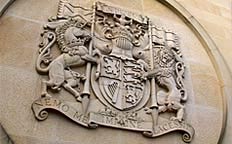Court

Court

Effective throughcare for prisoners and their families requires contact to be established between the prospective client[s] and local authority social work as soon as possible. For many people this will occur at the point of sentence and it is essential that court based social workers facilitate this. Detailed guidance on the provision of post-sentence interviews, which will often constitute the start of a throughcare service to an individual, is provided at paragraph 127 of the National Standards for Court Services.
Following sentence the court based social worker will interview the prisoner to:
- Clarify the decision of the Court.
- Establish whether any pressing problems should be dealt with immediately, such as child care arrangements, prescribed drug requirements etc. and take appropriate action.
- Assess risk of self harm and where appropriate complete the SPS Risk Identification Court Form, pass to the police officer and contact the receiving prison to advise of the risk.
- Inform the prisoner about social work services in prison and how to access them.
- Record details of the interview on a standard form that is returned to the SER author.
- Court Social Work Staff should also pass on any other information which may help the Scottish Prison Service in providing better care for the offender or in terms of public protection in line with the duty co-operate Sec.1 Management of Offenders Etc.[Scotland] Act 2005.
Criminal Procedure
There are two types of Criminal Justice Procedure — Solemn and Summary. Solemn covers the most serious cases involving trial on indictment before a judge or sheriff sitting with a jury. A Scottish jury is made up of 15 people and a simple majority [8-7] is sufficient to establish guilt or innocence. Three verdicts are available to a jury: guilty, not guilty, or not proven. A not proven verdict is the equivalent of not guilty in that it is an acquittal. Summary covers less serious offences involving a trial by a sheriff or magistrate sitting alone.
Criminal Courts
The Criminal Courts have three tiers — The High Court of Justiciary, Sheriff Courts, and District Courts. In addition there are separate Drug Courts and Children's Panels.
The High Court of Justiciary
Is the country's supreme criminal court. It handles the most serious crimes such as murder and rape. It is peripatetic, sitting in cities and larger towns as required. As an appeal court it sits only in Edinburgh. It comprises the Lord Justice General, The Lord Justice Clerk and another 30 judges known formally as Lords Commissioners of Justiciary. All prosecutions are brought in the name of the Lord Advocate and prosecuted by his appointed Advocate Deputes. Private prosecutions are possible but rare.
Sheriff Courts
There are 49 sheriff courts. A Sheriff Principal is appointed to one of six geographical areas and is responsible for the sheriffs in that area. They have limited sentencing powers dependant on the use of solemn or summary jurisdiction. If the court considers its sentencing powers to be insufficient it can remit a case to the High Court for disposal.
District Courts
District Courts sit in each local authority area under summary jurisdiction only. Each court comprises one or more Justices of the Peace [lay magistrates] who sit alone or in threes with a qualified legal assessor as convener or clerk of court. They handle cases of breach of the peace, drunkenness, minor assaults, petty theft, and offences under the Civic Government [Scotland] Act 1982.
Resources
Circulars
- SEJD Circular 18/2003 Protecting Children: Guidance on the Imprisonment and Preparation for Release of Schedule 1 Offenders. (PDF, 45KB)
- SWSG Circular 14 /1998 Extended Sentences. (PDF, 60KB)
- SEJD Circular 12 /2002 Enhanced Throughcare. (PDF, 64KB)
National Standard
Tools
- SPS Suicide Risk Identification Form (PDF, 17KB)
Tasks
- Tasks-Court (PDF, 65KB)
Resources
- Settled in Court (PDF, 188KB)